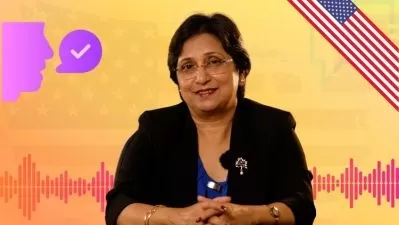About English LanguageLearn More
English is the standard language for international commerce, and is one of the most commonly spoken languages worldwide. Fluency in spoken English makes it easier to travel and do business with people in English speaking countries. An English course on Udemy can even help improve your employability in many global industries. English classes on Udemy focus on grammar, pronunciation, and conversation skills to help you gain confidence and fluency.
Sort by:
Sorting
The newest
Most visited
Course time
Subtitle
Frequently asked questions about English Language
Some aspects of English are more challenging than others. For example, some English language learners generally find tenses easy but may sometimes struggle with pronunciation. Luckily, you can immerse yourself in an English-speaking environment, no matter where you are. It is very easy to practice English; examples include speaking with native English speakers, taking an online English language course, or immersing yourself by traveling to an English-speaking country. Watching English-language TV and listening to English-language music and news are also excellent ways of immersing yourself in the language and improving your English skills.
English is the official language of 55 countries. It is the official language in well-known countries like England, Australia, India, the United States, Canada, and New Zealand. But it is also the official language in many smaller countries, such as Botswana, Antigua, Barbados, Gibraltar, Granada, and many more. There are over 300 million native speakers of English and almost 750 million non-native speakers of English. That's over one billion speakers of English worldwide. So, while English is not the most spoken language on the planet, it certainly is the most widespread. In addition, world travelers often communicate in English if they don't share a native language.
In many ways, the history of the English language is the history of the British Isles. Every invading and occupying person left its mark on the English language. English is a Germanic language that includes influences from Greek and Roman, with a healthy dose of French thrown in. There is also a smattering of Dutch and Norse influence and even a little bit of Urdu. Like many other languages, English borrows words from other languages. But, unlike many other languages, English preserves the spelling patterns and the pronunciations of words it borrows from other languages.
English has four major word classes: nouns, verbs, adjectives, and adverbs. Of these four classes, nouns are the largest, followed closely by verbs. Nouns are people, places, and things, such as cars, island, or engineer. Verbs are actions, including to write, to listen, and to drive. Adjectives are words that modify nouns: a green car, a smart engineer. Finally, adverbs can modify verbs and adjectives: walk quickly, a very tired puppy. However, there's more to it than just those four word classes. English is unique in a couple of ways. First, English speakers sometimes create new words by turning nouns into verbs. For example, in the sentence "We mothballed the project," the word mothball (originally a noun) was turned into a verb. Second, especially in everyday spoken English, people often use adjectives instead of adverbs. For example, "you drive too fast," where fast (an adjective) is used to modify the verb rather than quickly (an adverb).
American English is the most widely heard dialect of English because the United States is where many TV shows, movies, and music are made. However, millions of people speak British English. Australian and New Zealand English are also very common dialects, as is South African English. In terms of sheer numbers of speakers, Indian English and Pakistani English are very widespread. While people who speak different English dialects can usually mostly understand each other, they might have to be careful not to use too many idioms.
Increasingly, English has become a leading language for business, travel, science, and many other things. On the internet, over 25% of websites are in English. Anyone who hopes to do business outside of their country would find English helpful to communicate with people worldwide. Knowing English is often a requirement for people who wish to work in the hospitality industry. People who travel the world often rely on English to communicate with others, regardless of what country they're in. And that's just the beginning! Many forms of entertainment, including movies, TV shows, apps, video games, etc., are in English. As the world becomes more and more connected, it has relied more and more heavily on English as a shared language.
















